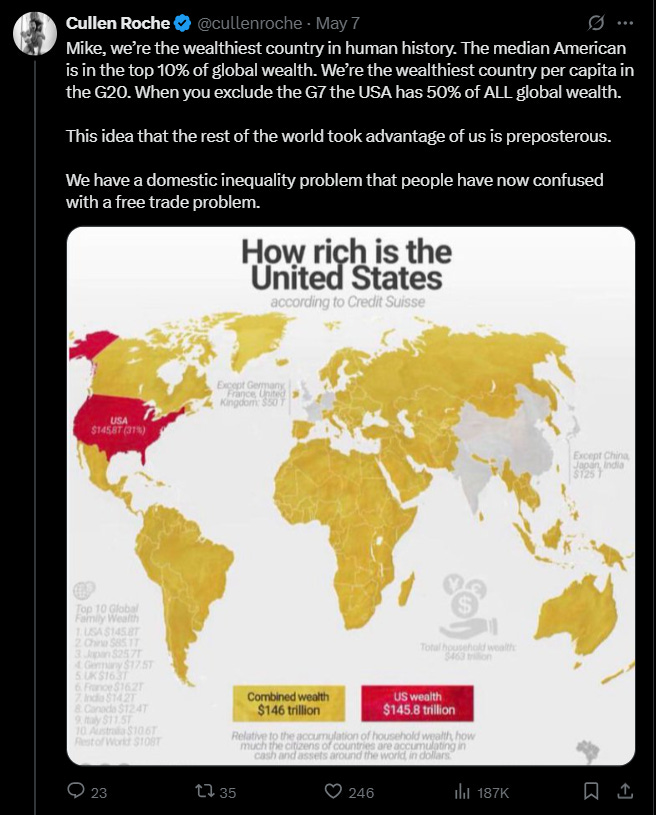Because I'm Free... Free Fallin'
The truth behind the free trade rhetoric
Last week, I had an extended Twitter conversation with Cullen Roche and Cliff Asness on the subject of free trade. As my regular readers know, I am a firm believer that trade improves outcomes. In fact, it was the first chapter I shared with readers in my upcoming book. In that chapter, I provided a simple (sweet) game my wife once shared to demonstrate the value of trade to the socialist leaning students at Hunter College. The outcome from one round of trade was an over 40% improvement in outcomes. The real world does not look that different — a regression of “trade openness” vs GDP per Capita generates a compelling “proof” that trade raises incomes. But note something important — the US is a fantastic outlier to this story:
In other words, trade doesn’t explain much of the US story at all. So we can boast all we want about the US being the richest country in the world
But it ignores that US income and wealth have sat at the top of the charts for well over 100 years. This remains true in aggregate (total US GDP, total US wealth), but much less true on a per capita basis. “We’re #1!” is a compelling cheer, but “We’re #8!” just sounds like a participation trophy.
Perhaps it’s just a coincidence that the US precipitous fall from #1 to #8 appears to have accelerated with the arrival of the China Shock, but this is absolutely the perception in MAGA country. And I don’t think they are wrong. Wealth is a relative, not absolute, game once you pass subsistence levels. The richest man in the neighborhood is typically quite magnanimous with his neighbors, perhaps even, Jay Gatsby-style, offering to thatch their roofs with straw; put him in a room with Elon Musk (please don’t do this at home) and he’ll likely dissect every petty flaw Elon exhibits… or fawn obsequiously. And with declining RELATIVE wealth, the US has predictably cast a covetous eye on the rest of the world… “
By attempting to DENY there is a problem (“the US is the richest country in history!”) we are amplifying the problem. The reality is that it’s much harder to “buy” a Chinaman than it used to be (this is intentionally inflammatory to highlight the absurdity of the idea. I do not actually support human trafficking. For better prose, I encourage you to read Jonathan Swift’s “A Modest Proposal”). For most Americans, something like this certainly FEELS accurate:
So we’re left with a conundrum:
Trade raises incomes globally
Trade explains almost none of US income levels
The “free trade” era has seen relative US income levels fall, by raising foreign incomes relative to the US
Why should the US support free trade?
The “not-so-simple” answer is that it doesn’t have to. As we have discussed repeatedly, the US is largely autarkic, requiring little trade from the rest of the world to function successfully. That’s largely because we aren’t one country, we’re ~25 countries (just like Europe) that trade frictionlessly amongst each other (please excuse ChatGPT for the terrible map… it’s illustrative).
If we present these regions as economically distinct, it looks something like this:
Note that total GDP is well below the current level of US GDP in this 25 country retelling. This is because exports and imports INTER-State account for a sizeable fraction of US activity, but is not captured in systems of national accounts. If we adjust for interstate trade (putting the US on equal footing with Europe for example), the US sits as a moderately wealthier nation due to international trade, but an absolutely wealthier nation because of interstate trade:
And that’s the real secret to why China came to the table — the US “needs” China to make life cheaper and more enjoyable. It does not NEED China. In contrast, China needs the US. You’ve heard the US is losing the trade war? That’s a lie. Just ask ChatGPT:









